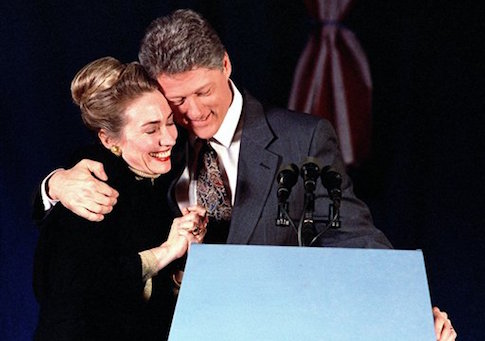Hillary Clinton has turned the drinking water crisis in Flint, Michigan, into a central issue for her campaign and will look to capitalize on that focus when she faces Bernie Sanders at Sunday's Democratic debate in the troubled city, but in the 1992 Democratic primary, it was Bill Clinton who was on defense for standing by as Arkansas' water was polluted.
Former senator Tom Harkin (D., Iowa) went after Clinton during a candidate forum that year for putting himself forward as an environmentalist even though Arkansas was an environmental disaster during his tenure as governor.
"Mr. Clinton, that was a very nice, flowery little speech, but we have to start reading the records and not the lips," said Harkin, who went on to point out that Arkansas was rated last in environmental policy during his governorship.
Here's video of the interaction:
Harkin also said that Clinton's Environmental Protection Agency was "a joke" and that it was "loaded with representatives of the biggest polluter in Arkansas."
That polluter was Tyson Foods, a powerful political backer of Clinton that contaminated the drinking water supply of more than 300,000 people with roughly 500,000 tons of chicken waste that was dumped into streams. The presence of "fecal bacteria" in the water caused entire towns near Tyson plants to be plagued by chronic dysentery and salmonella.
In one case, it took Clinton 17 months after being notified by health inspectors that a Tyson plant was leaking 1 million gallons of sewage into a town's water supply to take any action.
This turned into a major issue in the 1992 campaign, and not just for Clinton's opponents.
After Clinton won his party's nomination, CNN sent a reporter to Arkansas to examine just how bad the environmental situation was.
Here's video of the lengthy report:
The report found that state agencies were aware that 3,700 miles of Arkansas waterways were at risk of being destroyed by "agricultural source pollution" and that it took Clinton until 1990 to create a task force to address the problem.
One scientist who focused on the quality of Arkansas water expressed his belief to CNN that the only reason Clinton formed the task force was because of his presidential aspirations.
"I think there is a direct connection between the current emphasis on animal waste and runoff and his bid for the presidency," said hydrologist Skip Halterman.
Clinton is also criticized by CNN for giving a third of the seats on the task force to members of the poultry industry that was a major source of political contributions for Clinton.
A top adviser for President George H. W. Bush is quoted in the segment saying that "Clinton's record on the environment as governor of Arkansas is worst in the nation" and that his attempt to gloss over his environmental record "gives new meaning to the word ‘oil slick.’"
CNN said that Clinton was "politically vulnerable" on the issue.
The Clinton campaign did not respond to request for comment on the matter.
Though Hillary Clinton was not mentioned in the segment, she also established strong ties with Tyson and the poultry industry during her time in Arkansas.
She was criticized for making an investment in cattle futures based on the advice of Tyson's top lawyer James Blair, who, along with his wife Diane Blair, was a close confidante of the Clintons. Clinton made $100,000 on the investment, which took place the year before Clinton entered the governor's mansion.
Blair admitted to the New York Times that he advised Clinton to make the successful but risky investment. The Times wrote that Clinton was a major ally to Tyson during his time at the helm in Arkansas, noting that he looked the other way on environmental issues.
"During Mr. Clinton's tenure in Arkansas, Tyson benefited from a variety of state actions, including $9 million in government loans, the placement of company executives on important state boards and favorable decisions on environmental issues," the Times wrote in 1994.
Clinton was also called out Friday for voting against a 2005 bill in the Senate that was intended to prevent groundwater pollution.
